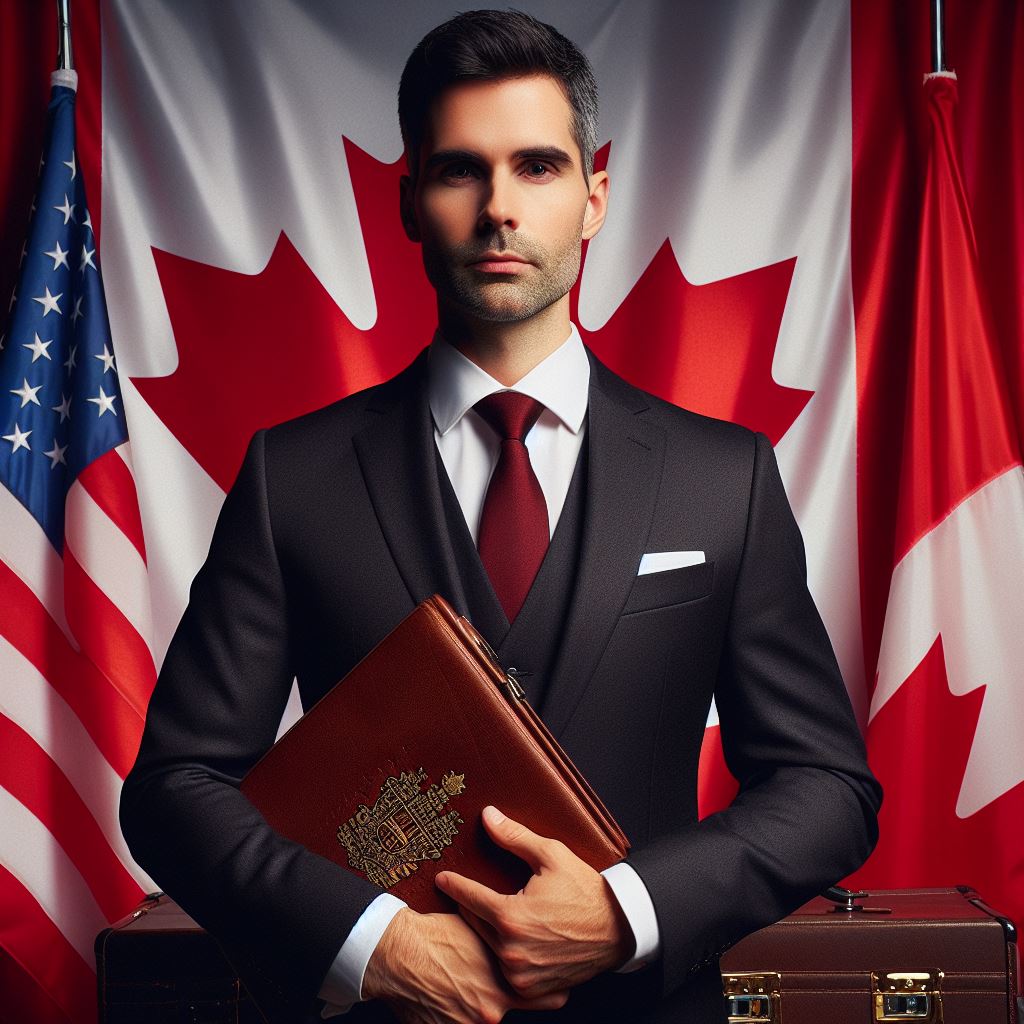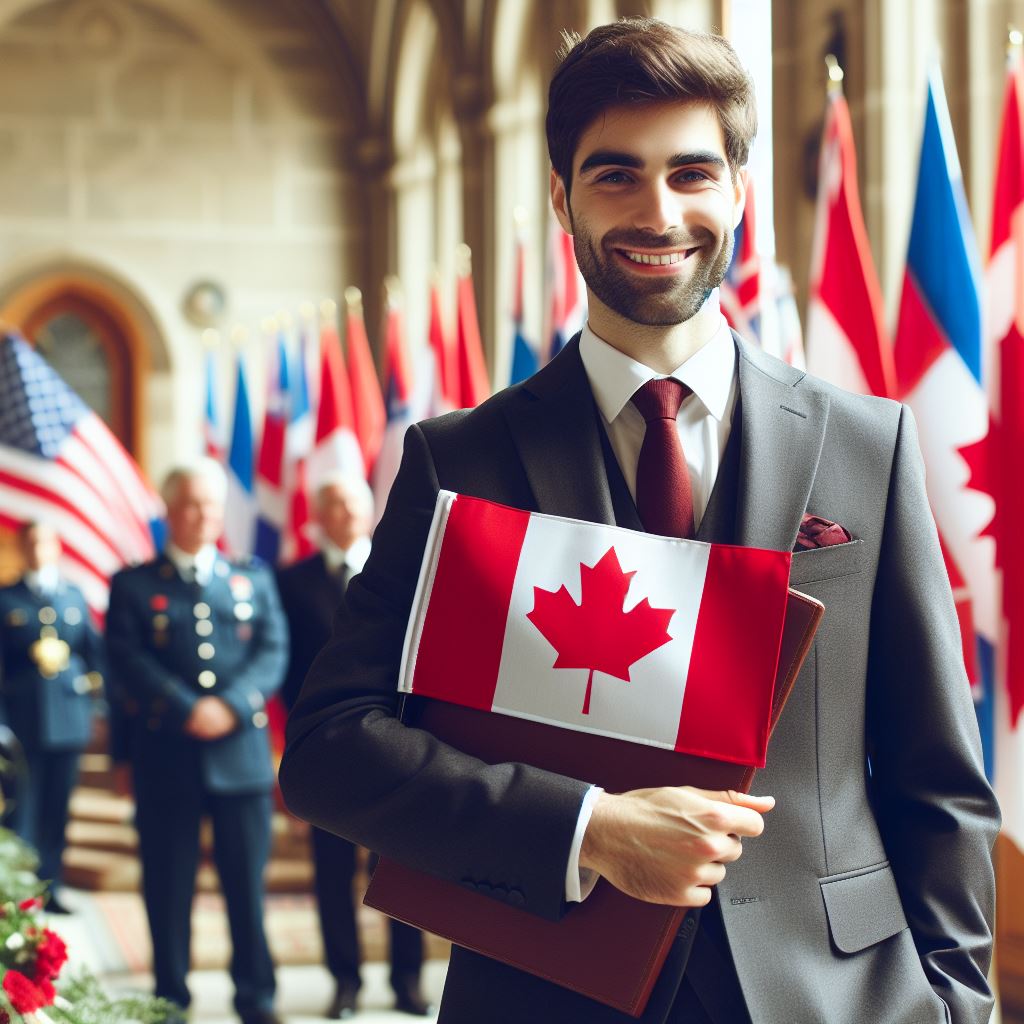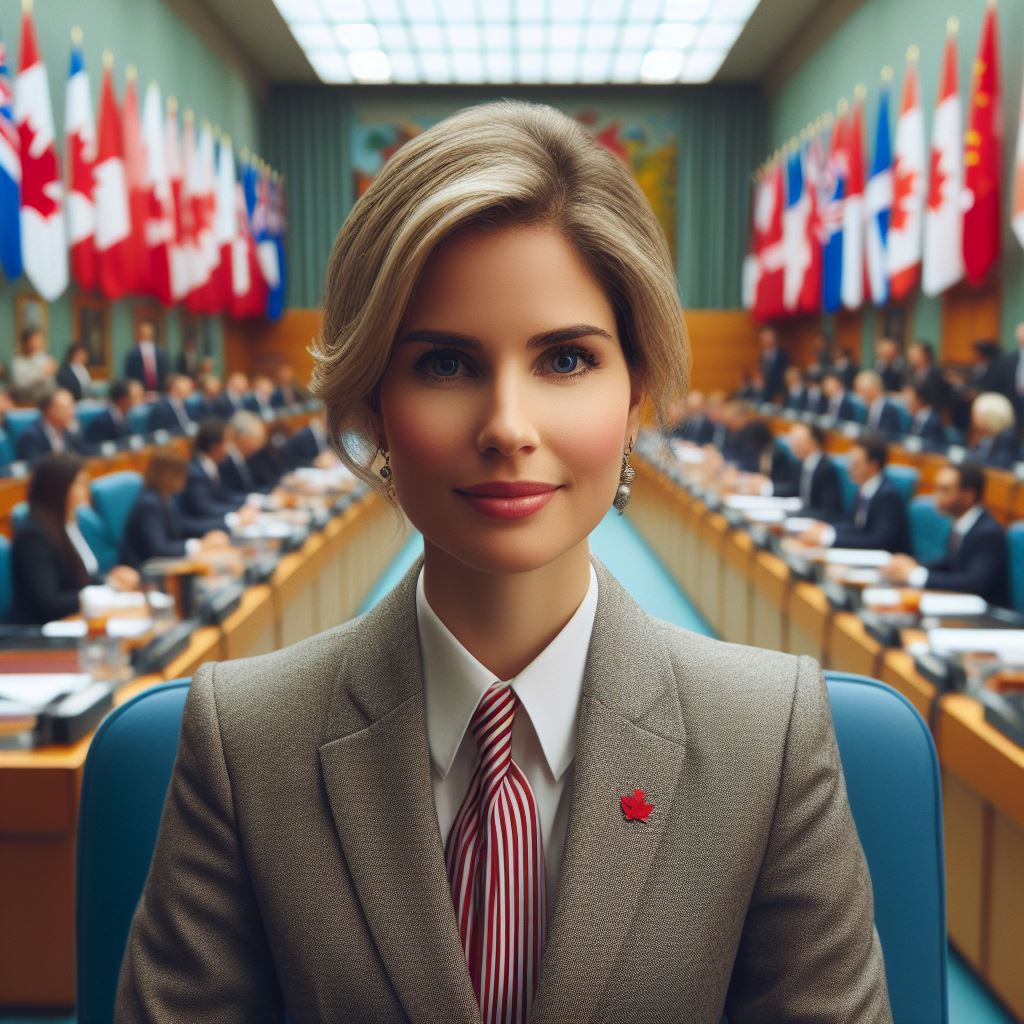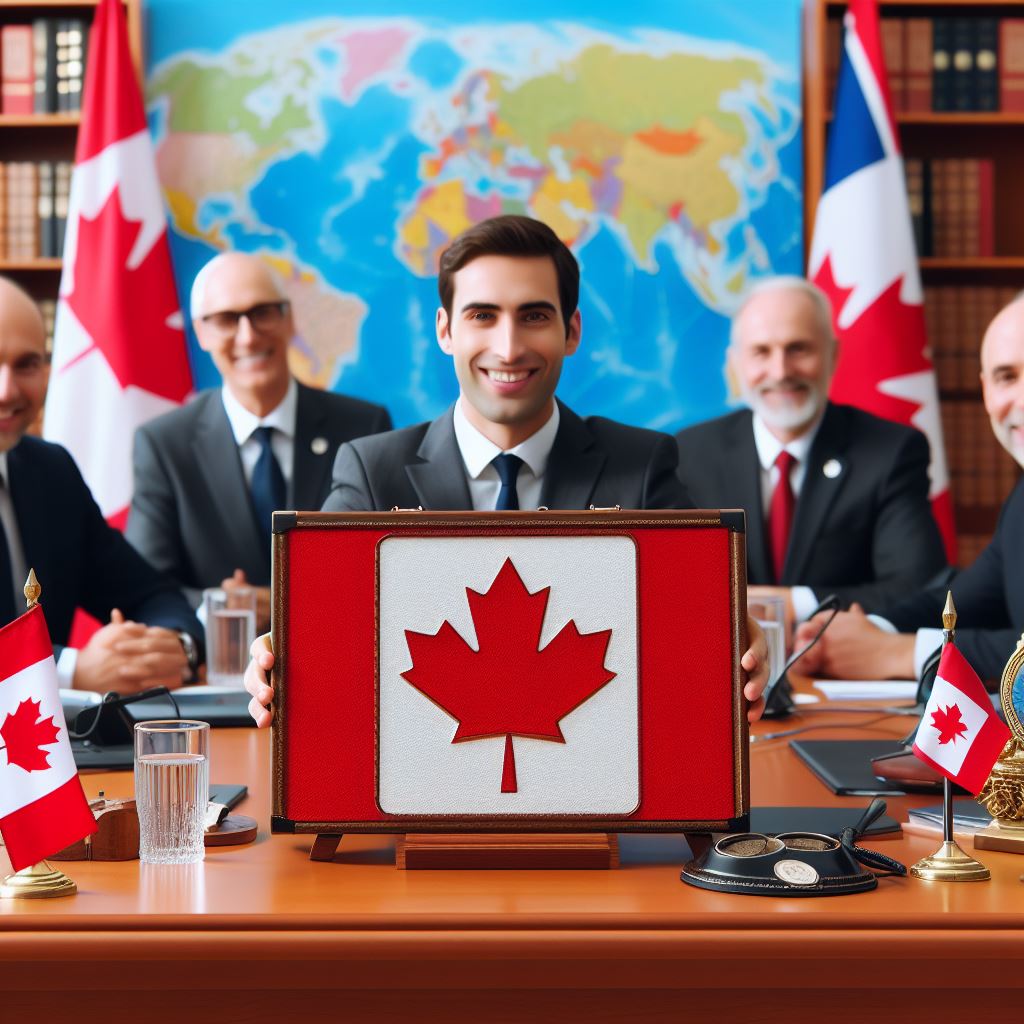Introduction
The evolution of diplomacy explores how the practice of international relations has developed over time.
Understanding this evolution from a Canadian perspective is crucial.
In this blog post, we will discuss the significance of adopting a Canadian viewpoint and preview the main points to be covered.
Embark on a nuanced exploration as we delve into “The Evolution of Diplomacy: A Canadian View,” unraveling the intricate tapestry of diplomatic history through the lens of Canada’s unique perspective.
This captivating journey traverses the annals of time, from the early foundations of diplomacy to the modern complexities of global relations.
Delve into the transformative journey of diplomatic practices, unveiling the pivotal moments that have shaped Canada’s role on the global stage.
Our narrative extends beyond conventional accounts, weaving together historical milestones and contemporary challenges.
From diplomatic breakthroughs to geopolitical intricacies, we navigate the dynamic landscape of international relations from a distinctly Canadian standpoint.
The rich tapestry of Canada’s diplomatic legacy unfolds, highlighting the country’s contributions to peacekeeping, multilateralism, and innovative diplomatic approaches.
As we journey through this comprehensive examination, we invite you to reflect on the adaptive nature of diplomacy and the ever-shifting dynamics that characterize the diplomatic sphere.
Engage with fresh insights and perspectives, discovering how Canada’s diplomatic identity has evolved over time and continues to influence the global stage.
Join us in this intellectual exploration, where history, geopolitics, and diplomacy converge to offer a profound understanding of “The Evolution of Diplomacy: A Canadian View.”
Historical Background of Diplomacy
Diplomacy, as we know it today, has a rich historical background dating back to ancient civilizations.
From the early interactions between city-states to the complex diplomatic relations among modern nations, diplomacy has evolved significantly over time.
In this blog post, we will provide a brief overview of the origins of diplomacy, discuss its traditional role in international relation, and highlight key developments and milestones that have influenced its history on a global scale.
Unlock Your Career Potential
Visualize a clear path to success with our tailored Career Consulting service. Personalized insights in just 1-3 days.
Get StartedThe Origins of Diplomacy
The origins of diplomacy can be traced back to ancient civilizations, such as Mesopotamia, Egypt, and China.
These early societies recognized the importance of maintaining peaceful relations and engaging in negotiations with neighboring territories.
Diplomatic communication channels were established through envoys, who served as mediators between different rulers and their empires or city-states.
These envoys were tasked with conveying messages, negotiating treaties, and resolving conflicts.
The Traditional Role of Diplomatic Relations
Diplomatic relations among nations have always aimed to establish and maintain peaceful coexistence.
Throughout history, diplomats have played a crucial role in fostering understanding, resolving disputes, and forming alliances.
Diplomats acted as representatives of their governments, engaging in diplomatic negotiations, signing agreements, and managing crises.
They served as intermediaries, working towards maintaining stability and promoting their countries’ interests.
Key Developments and Milestones in Diplomatic History
The history of diplomacy is peppered with significant developments and milestones, shaping the nature and practices of diplomatic relations globally.
Some key moments include:
- Treaty of Westphalia (1648): This treaty marked a turning point in diplomatic relations, as it established the principle of sovereignty and non-interference in the internal affairs of nation-states.
- Congress of Vienna (1815): Following the Napoleonic Wars, this congress aimed to restore stability in Europe by redrawing borders, establishing a balance of power, and promoting diplomatic negotiations as a means to resolve disputes.
- Creation of the League of Nations (1920): The League of Nations was the first international organization dedicated to maintaining peace and resolving conflicts diplomatically. Though it had limitations, it laid the foundation for future global cooperation.
- Formation of the United Nations (1945): After World War II, the United Nations was established to promote international cooperation, collective security, and diplomatic dialogue among member states.
- Cold War (1947-1991): The power struggle between the United States and the Soviet Union during the Cold War led to intense diplomatic negotiations, arms control agreements, and proxy conflicts around the world.
These are just a few examples of the many milestones and developments that have shaped the evolution of diplomacy throughout history.
Today, diplomacy continues to adapt and evolve in response to global challenges, technological advancements, and changing geopolitical dynamics.
Moreover, it remains a vital tool for maintaining peace, resolving conflicts, and advancing cooperation in an interconnected world.
Read: Top Challenges Faced by Modern Diplomats
Land Your Dream Canadian Job with a Perfect Resume
Unlock opportunities by tailoring your resume for Canadian employers. ATS-optimized and aligned with industry standards, this service boosts your chances of getting noticed and hired.
Start NowDiplomacy in Canada’s Early Years
The early years of diplomacy in Canada, including the colonial period
Canada’s early years of diplomacy were shaped by the colonial period.
Canada’s relationship with European powers and the British Empire
Canada had a complex relationship with European powers and the British Empire.
Significant diplomatic moments and challenges faced by Canada during this period
Significant diplomatic moments and challenges shaped Canada during this period.
Canada’s diplomatic journey began during the colonial period when European powers first established settlements on Canadian soil.
French and British explorers and traders played a vital role in shaping Canada’s early diplomatic landscape.
The French and British empires vied for control over Canadian territories, leading to conflicts and treaties.
The Treaty of Paris in 1763 marked a significant diplomatic moment for Canada as it ended French control in North America.
Following the Treaty of Paris, Canada fell under British colonial rule, further shaping its diplomatic relations.
Canada’s relationship with the British Empire became crucial, as it influenced its diplomatic ties with other countries.
Canada’s participation in British military and political affairs meant aligning its diplomatic interests with those of the British Empire.
The American Revolutionary War presented a diplomatic challenge for Canada, as it bordered the newly independent United States.
Canada’s loyalty to the British Empire during the war led to strained relationships with its American neighbors.
The War of 1812 was another significant diplomatic moment for Canada, as it was fought between the British Empire and the United States on Canadian soil.
Canada’s successful defense against American invasions during the War of 1812 solidified its position within the British Empire.
Elevate Your LinkedIn Profile for Canadian Success
Attract top Canadian recruiters by optimizing your LinkedIn profile. Boost your visibility with compelling keywords, a standout summary, and a professional presence that makes you unforgettable.
Get StartedThe Durham Report in 1839 laid the groundwork for responsible government in Canada, granting more autonomy in domestic affairs.
The move towards responsible government allowed Canada to exercise more control over its diplomatic relations.
The Confederation of Canada in 1867 marked another pivotal moment, as it united the colonies into a single Dominion.
Canada’s growing independence within the British Empire allowed for a more distinct diplomatic identity.
In the late 19th century, Canada faced diplomatic challenges related to its expanding western territories.
Negotiations with Indigenous peoples and disputes over land rights were central diplomatic issues during this period.
Canada’s diplomatic relations with other European powers, such as Germany, France, and Russia, also developed during this time.
The outbreak of World War I tested Canada’s diplomacy, as it became involved in the conflict alongside the British Empire.
Canada’s contributions to the war effort showcased its growing international significance and diplomatic capabilities.
In fact, the early years of diplomacy in Canada were shaped by the colonial period, the influence of European powers, and Canada’s relationship with the British Empire.
Significant diplomatic moments and challenges, such as treaties, wars, and the quest for more autonomy, played a crucial role in shaping Canada’s diplomatic identity.
Read: Canadian Diplomats: Skills and Qualifications
Impact of World Wars on Diplomacy
The impact of World War I on diplomacy and Canada’s role
World War I had a significant impact on diplomacy, both globally and for Canada.
The changes in diplomatic approaches and strategies due to the global conflicts
The global conflicts brought about changes in diplomatic approaches and strategies.
Canada’s participation in international negotiations and the formation of diplomatic alliances
Canada played a crucial role in international negotiations during and after the war.
The war led to the formation of diplomatic alliances that shaped the future of diplomacy.
Firstly, World War I brought about a shift in diplomatic approaches and strategies.
- Countries realized the importance of alliances and began forming them to protect their interests.
- Traditional diplomacy based on negotiations between individual nations was replaced by multilateral diplomacy.
- Collective security became a key principle to prevent future global conflicts.
- Great powers like the United States emerged as key players in shaping diplomatic relations.
Secondly, Canada’s role in the war significantly impacted its position in diplomacy.
- Canada’s participation in the war, alongside the Allied powers, elevated its global standing.
- Its contributions to the war effort and sacrifices made on the battlefield led to increased recognition.
- Canada became recognized as an independent nation with its own foreign policy and diplomatic initiatives.
- This newfound recognition allowed Canada to actively participate in post-war negotiations.
Thirdly, Canada actively engaged in international negotiations and formed diplomatic alliances.
- Canada was one of the signatories of the Treaty of Versailles, which ended World War I.
- Through the treaty, Canada sought to promote peace, stability, and collective security.
- Canada also played a significant role in the formation of the League of Nations, the precursor to the United Nations.
- As a member of the League, Canada actively participated in diplomatic efforts to maintain peace and resolve conflicts.
- Additionally, Canada formed diplomatic alliances with other countries to address common regional and global challenges.
In short, World War I had a profound impact on diplomacy and Canada’s role in it.
The global conflicts necessitated changes in diplomatic approaches and strategies.
Canada’s active participation in international negotiations and the formation of alliances solidified its presence in the diplomatic arena.
The lessons learned from World War I continue to shape diplomatic relations and the pursuit of global peace and stability.
Read: Diplomacy Training: What Does It Involve?

The Emergence of Multilateral Diplomacy
The shift towards multilateral diplomacy in the post-war era
In the post-war era, there has been a notable shift towards multilateral diplomacy.
Countries around the world have recognized the importance of working together to address global challenges and promote peace and stability.
The involvement of Canada in the United Nations and other international organizations
Canada has played a significant role in this shift towards multilateral diplomacy.
The country has been actively involved in the United Nations and other international organizations that promote cooperation and collaboration among nations.
key Canadian contributions to global peacekeeping and diplomacy
One of the key contributions of Canada to multilateral diplomacy is its active participation in the United Nations.
The country has been a member of the UN since its inception in 1945 and has actively worked towards promoting peace and resolving conflicts through diplomatic means.
Canada has also been part of various UN agencies and bodies, including the Security Council, the General Assembly, and the Economic and Social Council.
The country has used its position to advocate for human rights, sustainable development, and global cooperation on various issues.
Another important aspect of Canada’s involvement in multilateral diplomacy is its commitment to global peacekeeping.
The country has a long history of participating in peacekeeping missions around the world, including in places like Cyprus, the Balkans, and Haiti.
Canadian peacekeeping efforts have often focused on conflict prevention, civilian protection, and post-conflict reconstruction.
The country has contributed troops, police officers, and experts to these missions, showcasing its dedication to promoting peace and stability in conflict-affected regions.
Furthermore, Canada has been actively involved in diplomacy beyond the United Nations.
The country has been a member of various international organizations, such as NATO, the Commonwealth, and the Organization of American States.
These organizations provide platforms for Canada to engage with other countries and work towards common goals, such as regional security, economic cooperation, and democratic governance.
Canada’s involvement in multilateral diplomacy has not only contributed to global peace and stability but has also enhanced its reputation as a responsible and influential actor on the world stage.
By working together with other nations, Canada has been able to amplify its voice and effectively address global challenges, such as climate change, poverty, and human rights violations.
In essence, the emergence of multilateral diplomacy in the post-war era has significantly shaped the international landscape.
Canada, as an active participant in this shift, has made vital contributions through its involvement in the United Nations, peacekeeping missions, and various international organizations.
As the world continues to face complex challenges, the importance of multilateral diplomacy and cooperation becomes even more crucial.
Canada’s commitment to global cooperation serves as an example for other nations, highlighting the potential of collaboration in creating a more peaceful and prosperous world.
Read: Day in the Life of a Canadian Diplomat Abroad
Modern Challenges in Diplomacy
Diplomacy in today’s world faces numerous challenges that are unique to the contemporary global landscape.
These challenges demand innovative approaches and concerted efforts from nations to navigate through the complexities of international relations.
Canada, known for its strong commitment to diplomacy and multilateralism, has responded to these challenges with a focus on promoting human rights, utilizing soft power, and engaging in cultural diplomacy.
Contemporary Challenges Faced by Diplomacy
The 21st century has presented diplomats with a set of new and complex challenges that require adaptive strategies.
Globalization, rapid technological advancements, and the rise of non-state actors have reshaped the diplomatic landscape.
The proliferation of conflicts, cyber threats, climate change, and the ongoing pandemic all pose significant challenges to traditional diplomatic practices.
Moreover, the changing power dynamics and shifting alliances on the world stage have made diplomacy increasingly contentious.
The rise of populism, nationalism, and protectionism has challenged the principles of multilateralism and cooperation.
Canada’s Response to Contemporary Challenges
As a nation committed to diplomacy, Canada has proactively responded to these challenges by placing a strong emphasis on the promotion of human rights.
Canada has consistently advocated for and defended human rights both domestically and internationally.
It prioritizes championing gender equality, LGBTQ+ rights, indigenous rights, and freedom of expression.
Additionally, Canada recognizes the importance of soft power in today’s interconnected world.
Soft power refers to a nation’s ability to influence others through cultural, educational, and diplomatic means, rather than relying solely on economic or military might.
Canada leverages its cultural diplomacy, promoting its diverse society, arts, and culture to build relationships and foster understanding.
Canada’s multicultural approach has also been vital in responding to contemporary challenges.
With a diverse population, Canada actively engages with different cultures, fostering inclusive dialogue and building bridges between nations.
This inclusivity not only strengthens diplomatic ties but also promotes peace and understanding in an increasingly divided world.
The Importance of Soft Power and Cultural Diplomacy
In today’s interconnected world, soft power and cultural diplomacy have become essential tools for effective diplomacy.
Soft power allows nations to shape global narratives, build networks of influence, and resolve conflicts without resorting to force.
Cultural diplomacy, in particular, helps bridge gaps between nations, fostering mutual understanding and promoting peaceful relations.
Canada recognizes the power of cultural diplomacy and has leveraged it to strengthen its diplomatic relations across the globe.
Its diverse arts, music, literature, and cuisine have become influential tools in promoting Canadian values and fostering dialogue.
Furthermore, cultural exchanges, educational programs, and international collaborations are crucial components of Canada’s soft power strategy.
By investing in these initiatives, Canada reinforces its positive image while building trust and goodwill among nations.
Modern diplomacy faces unprecedented challenges, necessitating innovative approaches and adaptability.
Canada’s response to these challenges demonstrates its commitment to upholding human rights, utilizing soft power, and engaging in cultural diplomacy.
By prioritizing the promotion of human rights, leveraging soft power, and fostering cultural diplomacy, Canada strengthens its diplomatic ties and contributes to a more interconnected and peaceful world.
Discover More: Canadian Women in Politics: Challenges
Canada’s Unique Diplomatic Approach
Canada’s distinct diplomatic style and approach
Canada has a distinct diplomatic style and approach that sets it apart from other nations.
One key aspect of Canada’s diplomacy is its commitment to multilateralism and international cooperation.
Canada values inclusivity and believes in working collectively to address global challenges.
This approach is rooted in Canada’s belief that no single nation can solve global issues alone.
Canada also prioritizes dialogue and peaceful resolution of conflicts.
Rather than resorting to aggression or military intervention, Canada seeks diplomatic solutions.
This approach has earned Canada a reputation as a trusted and reliable mediator in international disputes.
Values and principles that shape Canada’s foreign policy decisions
Furthermore, Canada’s diplomacy is guided by fundamental values and principles.
These values include respect for human rights, democracy, and the rule of law.
Canada takes these principles seriously and integrates them into its foreign policy decisions.
For example, Canada is known for its strong advocacy for gender equality and LGBTQ+ rights.
Canada’s commitment to these values shapes its diplomatic engagements and policy choices.
The benefits and drawbacks of Canada’s diplomatic approach in a changing world
Canada’s diplomatic approach has both benefits and drawbacks in a changing world.
One benefit is that Canada’s commitment to multilateralism enhances its global reputation.
This allows Canada to effectively engage in international organizations and influence decision-making.
Canada’s emphasis on dialogue also contributes to peaceful and constructive international relations.
However, Canada’s diplomatic style may face challenges in a world increasingly dominated by power politics.
Other countries that prioritize assertiveness or use brute force may perceive Canada’s approach as weak.
Moreover, Canada’s commitment to inclusivity and collective action can sometimes slow down decision-making processes.
While it is important to consult and involve multiple stakeholders, this can lead to delays in implementing policies.
Nevertheless, Canada’s unique diplomatic approach remains an asset in today’s interconnected and complex world.
Moreover, by promoting dialogue, multilateralism, and human rights, Canada contributes to global stability and cooperation.
Conclusion
This blog post explored the evolution of diplomacy from a Canadian perspective.
We discussed how diplomacy has changed over the years, from traditional methods to modern practices.
We highlighted the importance of understanding this evolution for Canadians.
Understanding the evolution of diplomacy allows us to navigate the complex international landscape effectively.
It helps us adapt our approaches and strategies to promote Canadian interests and values on the global stage.
Diplomatic evolution provides us with valuable insights into the ever-changing nature of international relations.
In today’s interconnected world, where global challenges require collective solutions, the study of diplomacy becomes crucial.
Moreover, by understanding the evolution of diplomacy, Canadians can contribute meaningfully to solving global problems and creating a more peaceful and prosperous future.
As we reflect on the evolution of diplomacy, it’s essential to acknowledge that the journey is far from over.
Our world continues to change rapidly, presenting new challenges and opportunities.
Moreover, It is our responsibility, as Canadians, to stay informed, engaged, and adaptive in our diplomatic efforts.
So, let us embrace the lessons of the past, armed with the knowledge of the present, and step into the future of diplomacy with confidence.
Together, we can build a world where dialogue and cooperation prevail, fostering understanding, progress, and harmony among nations.




